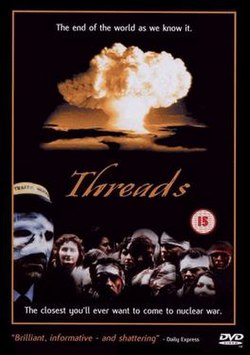Threads
| Threads | |
|---|---|
 |
|
| Written by | Barry Hines |
| Directed by | Mick Jackson |
| Starring | |
| Original language(s) | English |
| Production | |
| Producer(s) |
|
| Running time | 112m 27s |
| Distributor | BBC |
| Budget | £250,000–350,000 |
| Release | |
| Original release | 23 September 1984 |
Threads is a 1984 British television drama jointly produced by the BBC, Nine Network and Western-World Television Inc. Written by Barry Hines and directed by Mick Jackson, it is a docudrama account of nuclear war and its effects on the city of Sheffield in Northern England. The plot centres on two families as a confrontation between the United States and the Soviet Union erupts. As the nuclear exchange between NATO and the Warsaw Pact begins, the film depicts the medical, economic, social and environmental consequences of nuclear war.
Shot on a budget of £250,000–350,000, the film was the first of its kind to depict a nuclear winter. Certain reviewers nominated Threads as the "film which comes closest to representing the full horror of nuclear war and its aftermath, as well as the catastrophic impact that the event would have on human culture". It has been compared to the earlier programme The War Game produced in Britain in the 1960s and its contemporary The Day After, a 1983 ABC television film depicting a similar scenario in the United States. It was nominated for seven BAFTA awards in 1985 and won for Best Single Drama, Best Design, Best Film Cameraman and Best Film Editor.
The chronology of the events leading up to the war is depicted entirely via television and radio news broadcasts. An allegedly US-backed coup d'état in Iran prompts the Soviet Union to occupy the northern part of the country, ostensibly to prevent the return of a pro-Shah regime. On 8 May, the USA hints at deploying troops to Iran, to prevent the Soviets from reaching the oil fields in the south. On 11 May, the US Navy in the Indian Ocean is put on high alert when rumours begin to circulate of the disappearance of the USS Los Angeles in the Persian Gulf. The next day, a collision in the Gulf of Oman between the Soviet battlecruiser Kirov and the USS Callaghan leaves the former badly damaged. Subsequent discoveries by American and Israeli search and rescue vessels reveal debris and an oil slick from the missing Los Angeles, prompting the US President to warn the Soviets over the possibility of an "armed confrontation—with incalculable consequences for all mankind."
...
Wikipedia
